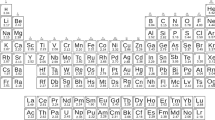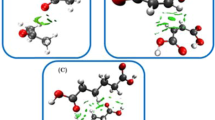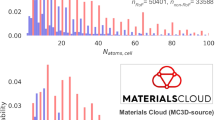Abstract
FOLLOWING J. J. Thomson, Kossel, and others, it can be shown that a large number of observed facts about co-ordination compounds can be explained on the assumption that these groups are held by purely electrostatic forces to the central atom. Grimm has been able to calculate the heat of association per molecule of NH3 surrounding the cation of a simple salt, from a knowledge of the heat of formation of the ammines and the lattice energy of the simple salt. He has shown that for a monovalent cation with an octet shell the heat of association is 14 calories per gram molecule, 28 calories for a divalent ion, and so on. Also, the maximum co-ordination number of an atom can be shown to depend on the relative size of the latter to those of the co-ordination groups.
This is a preview of subscription content, access via your institution
Access options
Subscribe to this journal
Receive 51 print issues and online access
$199.00 per year
only $3.90 per issue
Buy this article
- Purchase on Springer Link
- Instant access to full article PDF
Prices may be subject to local taxes which are calculated during checkout
Similar content being viewed by others
References
Bose, Zeit. fü Phys., Vol. 65, 677; 1930.
Author information
Authors and Affiliations
Rights and permissions
About this article
Cite this article
BOSE, D., DATTA, S. Raman Lines due to Co-ordination Bond. Nature 128, 725–726 (1931). https://doi.org/10.1038/128725b0
Issue Date:
DOI: https://doi.org/10.1038/128725b0
Comments
By submitting a comment you agree to abide by our Terms and Community Guidelines. If you find something abusive or that does not comply with our terms or guidelines please flag it as inappropriate.



